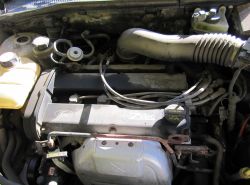The ethanol industry is responding today to a recent study designed to test vehicle compatibility with E15 and higher blends of ethanol. The study, “Mid-Level Ethanol Blends Catalyst Durability Study Screening,” was conducted by the Coordinating Research Council (CRC), a non-profit organization funded by the auto and oil industry. According to Growth Energy, the research is “inconclusive” because it failed to complete sufficient vehicle testing and it ignored a ‘pile of data’ from academic, government and third-party research that has shown that E15 does not harm engine and emission systems or affect durability or drivability.
 As disclosed in the CRC report, the organization’s aim was to show higher temperatures in certain vehicles using various blends of ethanol. They did in fact accomplish this goal but the average temperature change in the 4 cylinder vehicles was only a 2.0- 2.7 degree increase from E10 to E15 but there was a degree variance of 200 degrees among some of the vehicles. The reason for this could be that some of the vehicles were not designed to run on ethanol blends so the computer systems were not programmed to adjust to the alternative fuels. This said, these computer systems could be re-programmed to run on mid-level ethanol blends with no negative effects.
As disclosed in the CRC report, the organization’s aim was to show higher temperatures in certain vehicles using various blends of ethanol. They did in fact accomplish this goal but the average temperature change in the 4 cylinder vehicles was only a 2.0- 2.7 degree increase from E10 to E15 but there was a degree variance of 200 degrees among some of the vehicles. The reason for this could be that some of the vehicles were not designed to run on ethanol blends so the computer systems were not programmed to adjust to the alternative fuels. This said, these computer systems could be re-programmed to run on mid-level ethanol blends with no negative effects.
In addition, CRC did not disclose that of the 25 makes and models chosen for testing, several of them are more prone to catalysis failure than others regardless of the intermediate blend in the tank – meaning that particular car’s design is a bad design and will fail even if using straight gasoline.
“The CRC’s results are inconclusive and incomplete: only half of the vehicles completed durability testing,” said Tom Buis, CEO of Growth Energy. “It would be foolish to accept these results as fact. The EPA has told us in writing that they intend to complete their testing on E15 before making a decision, and we are confident they will. We are also confident that the testing will show what we already know: that E15 can run just fine in today’s modern engines, all while creating good paying jobs here in America.”
Last December, the Environmental Protection Agency (EPA) announced that current engine tests have indicated that 2001 and later vehicles may be eligible for E15. More recently, Secretary of Agriculture Tom Vilsack has indicated that he is “confident” that the E15 Waiver will be passed once testing is complete. In EPA’s response to Growth Energy’s E15 Waiver they said, “Although all of the studies have not been completed, our engineering assessment to date indicates that the robust fuel, engine and emissions control systems on newer vehicles (likely 2001 and newer model years) will likely be able to accommodate higher ethanol blends, such as E15.”
CRC has indicated that the research is ongoing and is slated to test 16 engines with model years ranging from 2001-2009; however, as of this writing, only eight engines have undergone durability testing with only four of these engines’ tests 100 percent complete. If the outcome of the E15 Waiver is that the EPA puts a vehicle year restriction on the use of E15, then the EPA must also publicly acknowledge that certain models are prone to fail regardless of the fuel blend in it’s tank to stave off unfair blame ethanol for catalyst problems.

